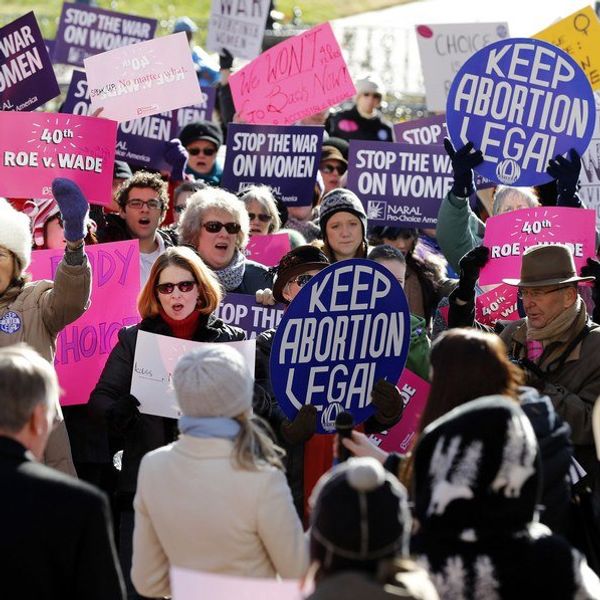The much-anticipated Women's March on Washington took place on Capitol Hill this past Saturday, the day after the inauguration of a new President of the United States. The March was accompanied by a series of sister events in all 50 states and in various cities across the globe. I partook in one such sister protest, in Lansing, Michigan. Organizers estimate that at least 2.5 people participated in protests worldwide, and some are making record-breaking claims. Subsequently seeing images flooding social media of my friends at marches and protests, and aerial shots of protesters flooding the streets in cities across the world, restored in me a bit of faith in humanity.
Forgotten in the news coverage of the inauguration and the march was the anniversary of Roe v. Wade, the landmark Supreme Court decision which decriminalized abortion in the United States on January 22, 1973, 44 years ago. The legal battle over reproductive rights has been a bit overlooked, in my opinion, in the ensuing outcry over Trump's election, but it is more relevant than ever.
In December, Republicans in the Ohio legislature attempted to pass a "heartbeat bill," banning abortions after the detection of a heartbeat, typically around 6 weeks, and thus essentially banning abortions altogether, since most who become pregnant don't find out until after that point. Such legislation was in direct contradiction with Roe v. Wade, which rules that the right to an abortion cannot be restricted until "viability," typically around 20-24 weeks, and thus would have been unconstitutional. Governor John Kasich vetoed it for those reasons, but not without signing another bill into law banning abortion after 20 weeks.
While it's debatable how far the "heartbeat bill" would have progressed before being swiftly struck down by a court, it sent a chill up the spines of reproductive rights advocates, because it seemed to indicate that Republicans were newly emboldened by the incoming administration. And that unease doesn't appear to be unfounded, as the threat to reproductive rights has not been limited to the state level; Speaker of the House Paul Ryan has vowed to defund Planned Parenthood as part of an effort to overturn the Affordable Care Act, and Republican representative Steve King, known for standing firmly on the wrong side of every issue, introduced a heartbeat bill similar to the failed one in Ohio at the federal level.
If such a bill passed, it might go all the way to the Supreme Court, and if that Supreme Court consists of primarily anti-abortion justices appointed by Trump, it could mean the end of Roe v. Wade, and thus the end of the right to choose being a guaranteed constitutional right in the United States.
It's certainly a troubling thought. There was a time when I would have rejoiced at the prospect of overturning Roe v. Wade, when I would imagine my jubilee at hearing that the Supreme Court had sided with life. Now, such a prospect horrifies me.
I believe the right to dictate what to do with one's own body to be essential to a free society. I do not believe it to be conducive to a free society to force an individual give up their body for 9 months, in a process with many potential hazards to their health, and even their lives. We don't force people to donate their organs, no matter the stakes, so why force people to literally house humans inside their bodies? My position on abortion is more complex and nuanced than that, but that's basically it in a nutshell.
Seeing news reports of Paul Ryan vowing to gut Planned Parenthood's funding gave me immense anxiety. But in the midst of such anxiety, I stumbled upon a video on YouTube which gave me a bit of comfort: an old episode of Real Time with Bill Maher from 2005, after Hurricane Katrina. The subject of abortion came up at one point, and both Maher and one of his panelists predicted that Roe v. Wade was guaranteed to be scrapped, now that then-President George W. Bush had won reelection, and was likely to appoint anti-abortion Supreme Court justices is. Bush has since left office, and Roe v. Wade was, and is, still intact.
Hearing that gave me a huge sense of relief. Of course, the dynamics of today's elected officials are a bit different now than they were in 2005, and we are right to be prepared for attacks on reproductive rights. The threats to Roe v. Wade and Planned Parenthood are real, but not guaranteed. Even with a Republican majority in both the House and Senate, those who are hellbent on gutting Planned Parenthood still face obstacles in doing so. A surprisingly large faction of those who voted for Donald Trump support Planned Parenthood, so defunding it could hurt Republicans' popularity. Furthermore, two Republicans in the Senate--Susan Collins and Lisa Murkowski--are pro-choice and support Planned Parenthood, and won't support an effort to repeal the Affordable Care Act which includes defunding Planned Parenthood, as was the case in 2013, when the government shut down over the issue.
Remain vigilant and monitor legislation, but don't lose hope, and don't despair. I hope that at least some who read this found some solace in the anecdote I shared above. I don't know what the next four years will bring about, but I am resolving to hope for the best while preparing for the worst. We must continue to raise our voices in the manner that those of us who marched did on Saturday. We must extend that passion and initiative to the ballot box, and communicate loud and clear to our leaders that we care, and we won't allow people to be stripped of the right to their own bodies.
We won't go back.





















